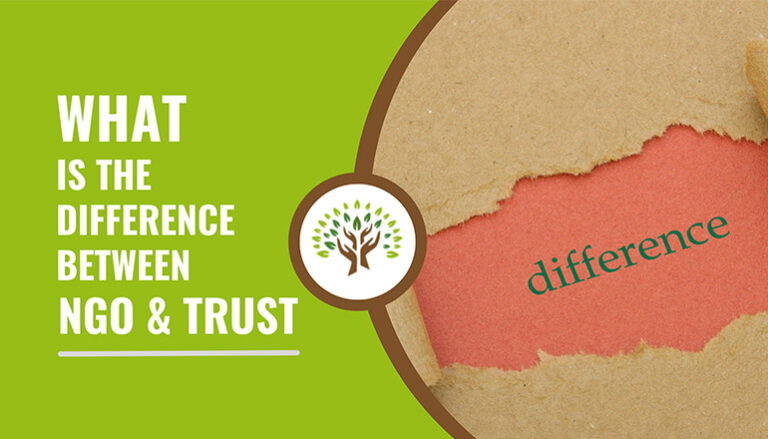By:Sakshi |
Updated on:Jun 30, 2025 |
Category:Trust

When it comes to nonprofit organizations, the terms NGO (Non-Governmental Organization) and Trust are often used interchangeably. While they share similarities in their missions and goals, there are distinct differences between the NGO and Trust. This article aims to explore and clarify the disparities between NGOs and Trusts, shedding light on their legal structures, formation processes, governance, objectives, funding, and more.
An NGO, or Non-Governmental Organization, is a type of organization that operates independently of the government. NGOs are driven by a social or humanitarian mission and work towards addressing various societal issues. They can be local, national, or international in scope, and their activities can range from providing aid and relief in times of crisis to advocating for human rights or environmental conservation.
A Trust, on the other hand, is a legal arrangement where assets or property are held and managed by one party (the trustee) for the benefit of another party (the beneficiary). Trusts are primarily established for philanthropic or charitable purposes and can be created by individuals or entities such as corporations. The main objective of a trust is to ensure the efficient management and distribution of assets for the intended charitable causes.
NGOs can be registered under various legal structures depending on the country or jurisdiction. They can be established as nonprofit corporations, charitable trusts, or associations. The legal framework for NGOs differs across jurisdictions, and it is crucial for organizations to comply with the relevant laws and regulations governing their operations.
Trusts, on the other hand, are a specific type of legal entity governed by trust laws. They are formed through a trust deed, which outlines the terms and conditions under which the trust operates. Trusts are often established as irrevocable entities, meaning that the assets held by the trust cannot be easily altered or revoked without proper legal procedures.
Register your Trust with Ngoexperts in easy steps
The process of forming an NGO involves several steps, which may vary depending on the jurisdiction. Typically, it requires registering the organization with the appropriate governmental or regulatory body, providing necessary documentation, such as articles of incorporation, bylaws, and a mission statement. NGOs may also need to fulfill specific criteria related to their objectives, governance, and funding sources.
On the other hand, the formation of a trust involves creating a trust deed that specifies the purpose of the trust, identifies the trustee and beneficiary, and outlines the rights and responsibilities of each party. The trust deed must be properly executed and registered according to the applicable laws and regulations.
NGO and Trust have distinct governance structures. NGOs are often governed by a board of directors or trustees who are responsible for overseeing the organization’s activities, decision-making, and strategic direction. The board is typically composed of individuals with expertise and experience relevant to the NGO’s mission and objectives.
Trusts, on the other hand, are governed by trustees who are legally bound to manage the trust’s assets and carry out its charitable objectives. The trustees have a fiduciary duty to act in the best interest of the trust and its beneficiaries, ensuring proper management, investment, and distribution of assets.
NGO and Trust may have similar objectives in terms of serving the public good, but their focus and areas of operation can differ. NGOs can work across a wide range of sectors, including education, healthcare, poverty alleviation, environmental conservation, and more. Their activities can be project-based or long-term initiatives aimed at addressing specific social or developmental issues.
Trusts, on the other hand, typically have a more specific focus or purpose. They are often established to support a particular cause or target a specific area of need. For example, a trust might be created to fund scholarships for underprivileged students or provide medical assistance to a specific community.
Both NGO and Trust rely on funding and resources to sustain their operations and achieve their objectives. NGOs often seek funding from diverse sources, including government grants, private donations, corporate sponsorships, and fundraising activities. They may also generate income through fee-based services or income-generating projects.
Trusts, on the other hand, are primarily funded through endowments or donations made by the settlor or other benefactors. These endowments are typically invested, and the returns generated are used to support the trust’s charitable activities. Trusts may also receive additional donations or bequests from individuals or organizations that share a common interest in the trust’s mission.
Both NGO and Trust can enjoy certain tax benefits depending on the jurisdiction. NGOs are often granted tax-exempt status, which exempts them from paying income tax on their nonprofit activities. Additionally, donations made to NGOs are generally tax-deductible for the donors.
Trusts, too, can benefit from tax exemptions, especially if they are established for charitable purposes. In many jurisdictions, charitable trusts are eligible for tax benefits, including income tax exemptions, exemption from capital gains tax on the sale of trust assets, and tax deductions for donors contributing to the trust.
NGO and Trust have different accountability mechanisms in place. NGOs are accountable to their board of directors, stakeholders, and the public. They are expected to maintain transparency in their operations, financial reporting, and use of resources. Many NGOs undergo regular audits and publish annual reports to demonstrate their accountability and provide information to their stakeholders.
Trusts, on the other hand, are accountable to the trust’s beneficiaries and the regulatory authorities overseeing charitable organizations. Trustees have a legal duty to act in the best interests of the beneficiaries and manage the trust’s assets in a responsible and accountable manner. Trusts may also have reporting requirements, depending on the jurisdiction, to ensure transparency and accountability.
Both NGOs and Trusts may have reporting requirements to fulfill. NGOs are often required to submit annual reports detailing their financial statements, activities, and impact. These reports may be submitted to regulatory authorities, funding agencies, or made available to the public.
Trusts, too, may have reporting obligations, including the submission of annual financial statements and reports on the distribution of assets or funds. The extent of reporting may vary depending on the jurisdiction and the size of the trust.
In the event of dissolution or closure, NGO and Trust follow different processes. NGOs typically have dissolution clauses in their bylaws or articles of incorporation, which outline the steps to be taken in case of closure. These steps may include the distribution of remaining assets to other charitable organizations or transferring them to a trust or foundation with similar objectives.
Trusts, on the other hand, have their own dissolution processes specified in the trust deed. The trust deed may outline how the trust’s assets are to be distributed or used for charitable purposes in the event of dissolution.
Q1 Are NGOs and Trusts the only types of nonprofit organizations?
Ans1 No, there are other types of nonprofit organizations, such as foundations, charities, and social enterprises.
Q2. Can an NGO also be a Trust?
Ans2. Yes, it is possible for an NGO to be established as a Trust, depending on the legal requirements and the desired structure.
Q3. Are NGOs and Trusts regulated by the same laws globally?
Ans3. No, the legal frameworks governing NGO and Trust can vary from one jurisdiction to another.
Q4. Can individuals establish Trusts for personal purposes?
Ans4. Yes, individuals can establish Trusts for personal purposes, such as managing family assets or providing for future generations.
Q5. Can Trusts engage in advocacy and policy work like NGOs?
Ans5. While advocacy and policy work are more commonly associated with NGOs, Trusts can also engage in such activities, depending on their objectives and legal restrictions.

I am a dedicated and detail-oriented Website Content Writer with over two years of experience in creating compelling, reader-friendly, and SEO-optimized content. My expertise lies in developing well-structured web pages, landing pages, blogs, and service descriptions that enhance user engagement and drive organic traffic.